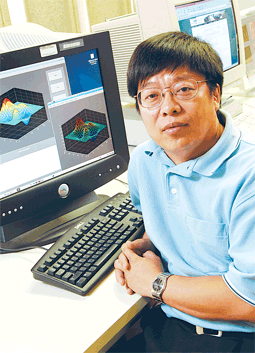|
Issue: 09/27/06

2006 University Scholar Derong Liu
Can a computer learn from its mistakes?
[print version]
[email article]

09/27/06
Paul Francuch
Derong Liu: creating a computer that learns and remembers.
Photo: Roberta Dupuis-Devlin
The
University Scholars Program, now in its 22nd year, honors faculty
members for superior research and teaching, along with great promise
for future achievement. The award provides $10,000 a year for three
years.
Can a computer be programmed to learn from its mistakes, just like a person?
Derong Liu thinks so.
"When I was a child, I imagined machines doing things automatically," said Liu, professor of electrical and computer engineering.
His
curiosity led him to study mechanical engineering as an undergraduate
in China. By the time he entered a master's program at Beijing's
Institute of Automation of the Chinese Academy of Sciences, he had
switched to a field of electrical engineering called automatic control.
"That
required additional study in electronics, circuits and automatic
control theory," he recalled. "I discovered this was something
that I'd really like to do as a career."
After finishing his
Ph.D. at Notre Dame, Liu worked at the General Motors Tech Center in
suburban Detroit and as an assistant professor at the Stevens Institute
of Technology in Hoboken, N.J., before joining the UIC faculty in 1999.
As
part of his ongoing research, Liu is interested in developing what are
called artificial neural networks, which mimic animal nervous systems.
"A neural network is a nonlinear dynamical system. The human brain is also a nonlinear system,” he explained.
Liu’s research focuses on adaptive dynamic programming, or approximate dynamic programming.
“This
scheme mimics the human brain's learning capabilities,” he said, adding
that the field is in such early stages of study that only a few
researchers around the world are working on it.
He and his
students are studying new ways to control such devices as computers,
car engines and other machines that traditionally work in a straight
"a-to-z" manner, considering the multitude of simultaneous factors
needed to make an intelligent decision.
"When you learn
something, you don't usually use it right away. You wait until
the next time you need it," he said. "The approach we're studying is
very similar to this concept.
“What we eventually can
have is a machine which will do something and if it does it good,
remembers. The next time, it will do the same thing.
“But
if it does not do a good job, it also remembers that and next time
tries to correct it. So it basically has a kind of reward or
penalty whenever the machine does something."
And how do you reward a computer?
"It's just numbers," Liu said.
"You
tell the computer that it gets a positive number when it does a good
job or a negative number when it does a bad job."
|
